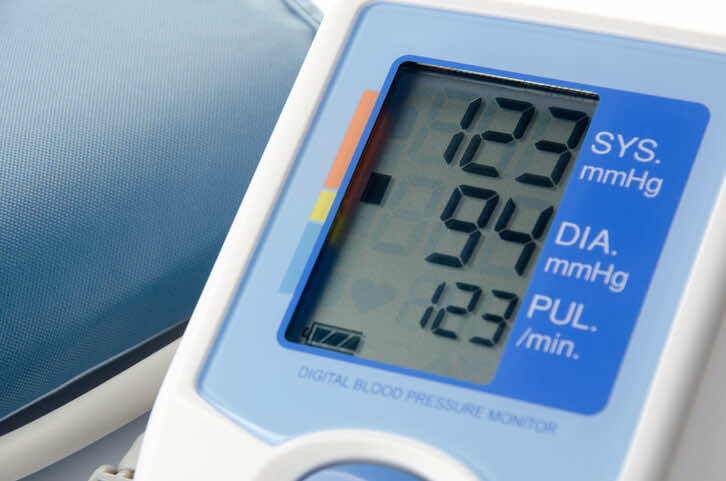BLOOD PRESSURE: THE HIGHS & THE LOWS
When you visit a GP, one of the first things they might do is take your blood pressure. So blood pressure must be important, right?
Correct! Blood pressure is very important in determining how unwell a patient is in the short-term, and it has many implications in long-term health. It can all get a bit complicated which is why we've simplified the world of blood pressure into this one straight-forward article. Let's leave the complicated parts to our private doctors, and start from the top!
What Does 'Blood Pressure' Mean?
When you hear people talking about having a high blood pressure or a low blood pressure, what do they actually mean by this? Blood pressure is a measure of the force of your heart pushing the blood around your body.
What Do The Numbers Mean?
It is important to monitor blood pressure, as significant changes can be a sign of health issues. When your blood pressure is measured, the doctor will note two main numbers. These numbers refer to:
- Systolic blood pressure - The higher number
- Diastolic blood pressure - The lower number
The systolic blood pressure is the number that is larger and is quoted first – it is the pressure that the blood is at when your heart muscle contracts and forces the blood around the body.
The diastolic blood pressure is the smaller number and is usually quoted second – this is the lowest pressure that is achieved when the heart is relaxed and not beating.
Not too complicated after all, hey!*

A blood pressure reading
*That said, the unit for both of these numbers is 'mmHg', meaning 'millimetres of mercury' . The reason for this, we must admit, is too complicated to cover in this article but relates to the old-fashioned way of monitoring BP using a mercury sphygmomanometer!
Normal Blood Pressure
A blood pressure in a normal range is between 90/60mmHg and 140/80mmHg – the first numbers (90 and 140) refer to the systolic blood pressure, and the latter numbers (60 and 80) refer to the diastolic blood pressure.
High Blood Pressure
A high blood pressure is anything over 140/90mmHg (clinic reading). This is also known as 'hypertension', and when referring to someone having high blood pressure, doctors may describe an individual as being 'hypertensive'.
Having high blood pressure may not result in any symptoms at all - you may be completely unaware. However, the following are symptoms that might be experienced by people who are hypertensive:
- Headaches - by far the most common!
- A pounding in your head, ears or chest
Less common symptoms (in cases of very severe hypertension) may include:
- Chest pain
- Vision problems
Hypertension: What's The Problem?
High blood pressure is associated with increased risk of many serious medical conditions, including:
- Stroke
- Heart attack
- Coronary heart disease
- Kidney disease
- Vascular dementia
It is therefore important to have your blood pressure checked, to identify any issues and correct them before any such complications can arise.
Some people are more at risk of having high blood pressure than others, and this is where lifestyle factors especially come into play. These 'at risk' people include those who:
- Live a sedentary lifestyle and carry out limited exercise
- Smoke
- Drink excessive alcohol
- Drink excessive caffeine
- Have stressful lives
- Have sleep disturbances
- Have relatives with hypertension
- Consume large amounts of salt
- Eat unhealthily
- Are obese
Age is another risk factor for hypertension - and is one of the few that we (sadly!) can't change. With significant lifestyle changes, it is possible to bring your blood pressure down without medical intervention.

Drinking excessive amounts of caffeine can put you more at risk of high blood pressure
High Blood Pressure Treatment
Severely hypertensive patients are at a greater risk of complications - such as stroke, cardiac arrest or kidney failure - and are usually immediately placed on medication. There are a variety of drugs available to treat hypertension, so we will run you through a few of the most common types!
1. ACE Inhibitors
For those who are under 55 years of age or diabetics or those who are not Afro-Caribbean, a medication called an ACE inhibitor is usually offered. These can occasionally cause a dry cough, which is something your doctor will advise you to look out for. If this is the case, then it is possible to switch to a similar drug called an 'ARB'. These drugs work by relaxing the blood vessels, and thus the blood pressure is reduced.
2. Calcium Channel Blockers
Those who are over 55, or of Afro-Caribbean origin, are offered a calcium channel blocker; these also bring about vasodilation – the widening of your blood vessels. As the blood vessels are wider, more blood can flow through easily and thus the pressure that the blood is flowing at is reduced.
3. Beta Blockers
Another group of drugs used to treat high blood pressure is called 'beta blockers'; these drugs work by reducing the rate at which the heart beats. This in turn reduces the force of the heart's contraction, and thus lowers the blood pressure of the individual.
Other groups of medications used to treat blood pressure include 'Thiazide Diuretics' and 'Alpha Blockers', although we won't go into these topics now.
Low Blood Pressure
A low blood pressure is anything below 90/60mmHg. Low blood pressure can often lead to symptoms of light-headedness, dizziness and fainting.
That said, there can be lots of natural causes for low blood pressure, including:
- Temperature - when you are warmer, your blood vessels are more dilated and thus your blood pressure is lower
- Time of day - at night, your blood pressure is lower (it is highest around mid afternoon)
- Exercise - those who are fitter are likely to have a lower resting blood pressure as their heart muscle and blood vessels are more efficient
- Eating - after you have eaten, the blood is directed towards your GI system to digest the food. This can lower your blood pressure
- Dehydration - if you are dehydrated, your blood pressure might become lower, as your blood volume drops
However low blood pressure can also be a sign of something more concerning, for example:
- Anaemia - low iron content of your red blood cells
- A heart condition - a heart defect may be resulting in your heart not be pumping as effectively
- Hormonal imbalances
- Neurological issues - whereby the communication between your heart and nervous system is not working effectively
Overall, both high and low blood pressure can sometimes be a sign of something more serious. That's why doctors make the most of every chance they get to check your blood pressure! If you haven't had your blood pressure checked in a while, or you think you're experiencing symptoms of high or low blood pressure, don't hesitate to book a private GP consultation at LDC for a quick and efficient review! We have GP surgeries located across central London, so should never be too far away when you are looking for a "doctor near me".
